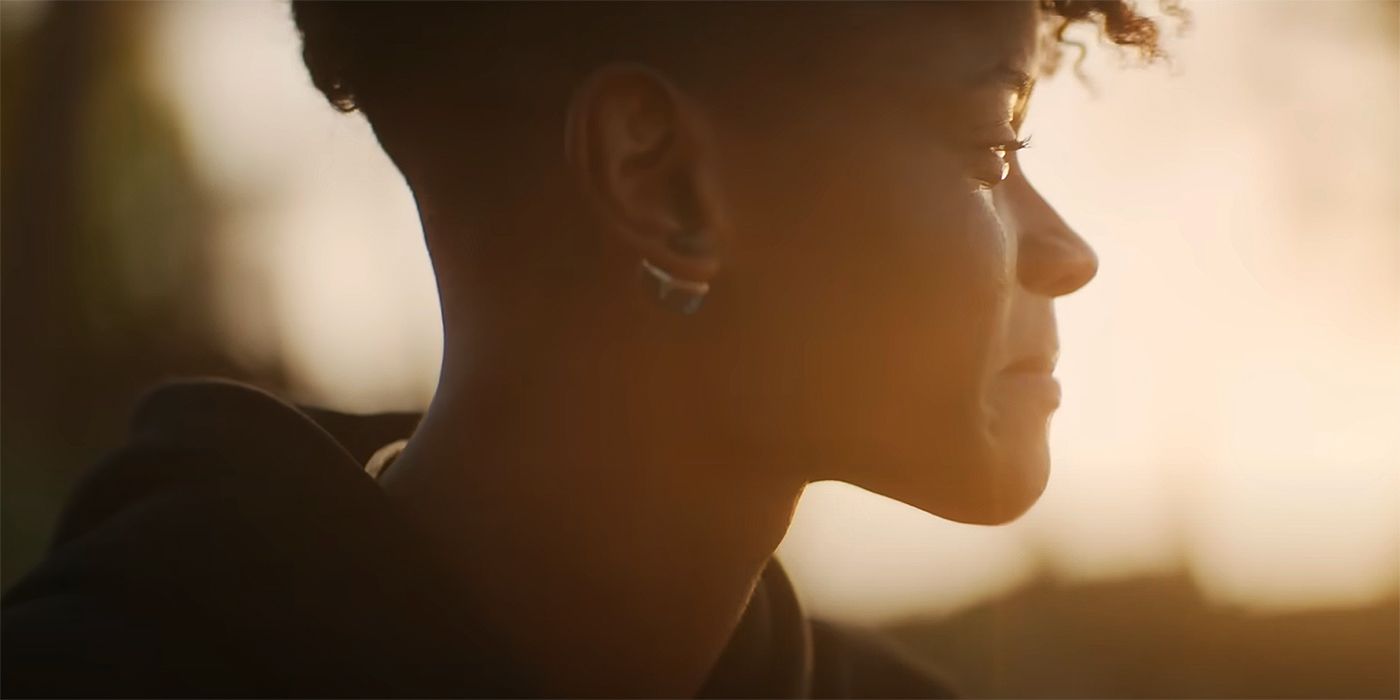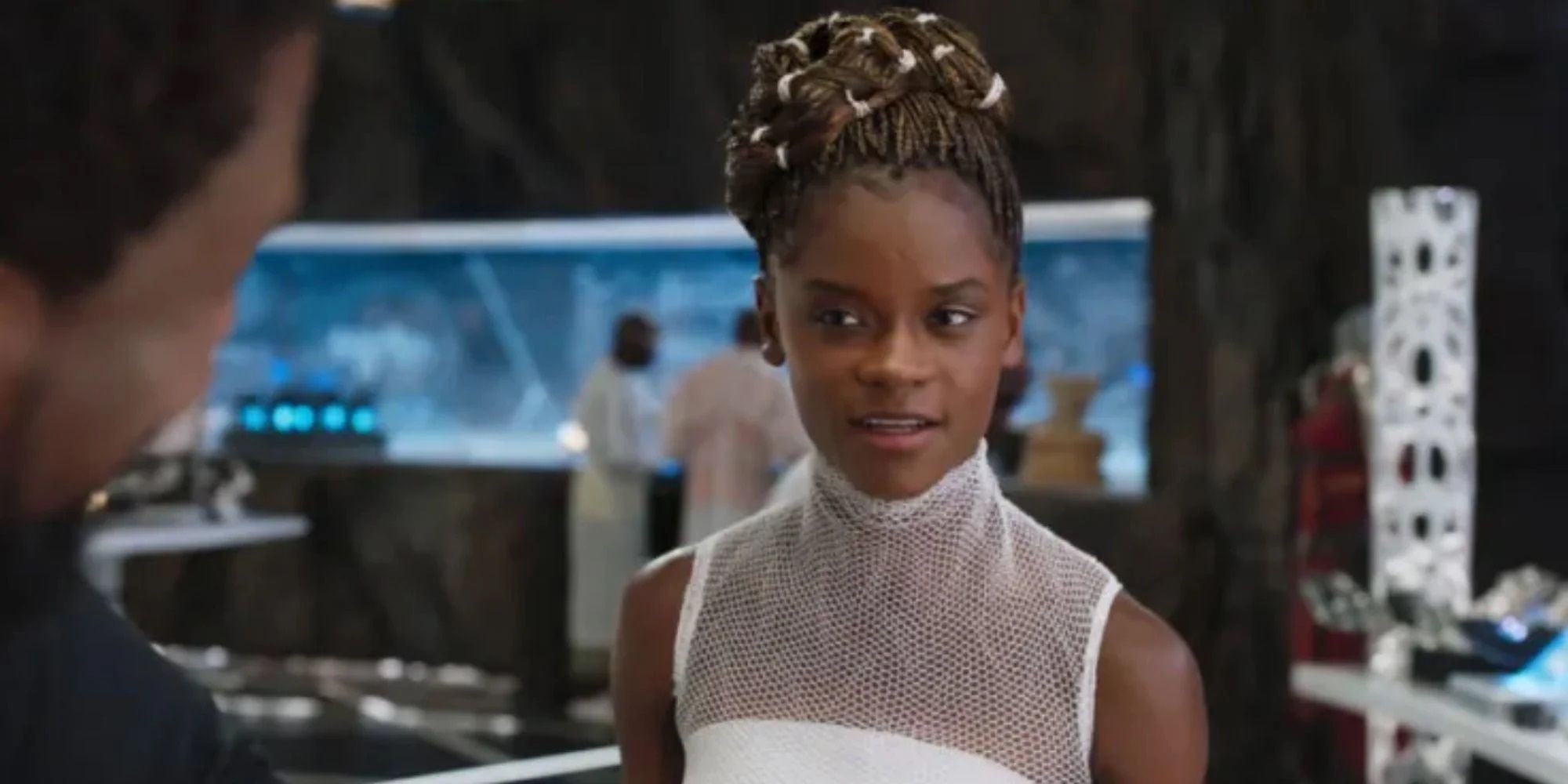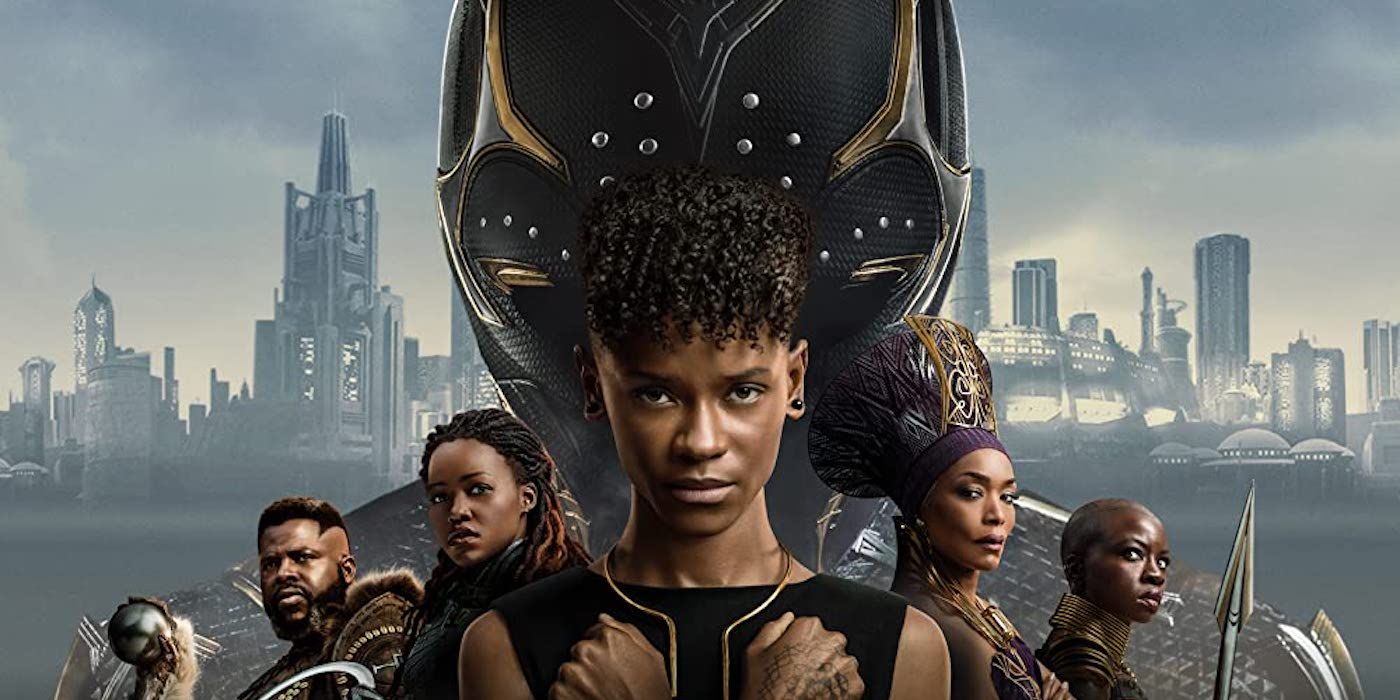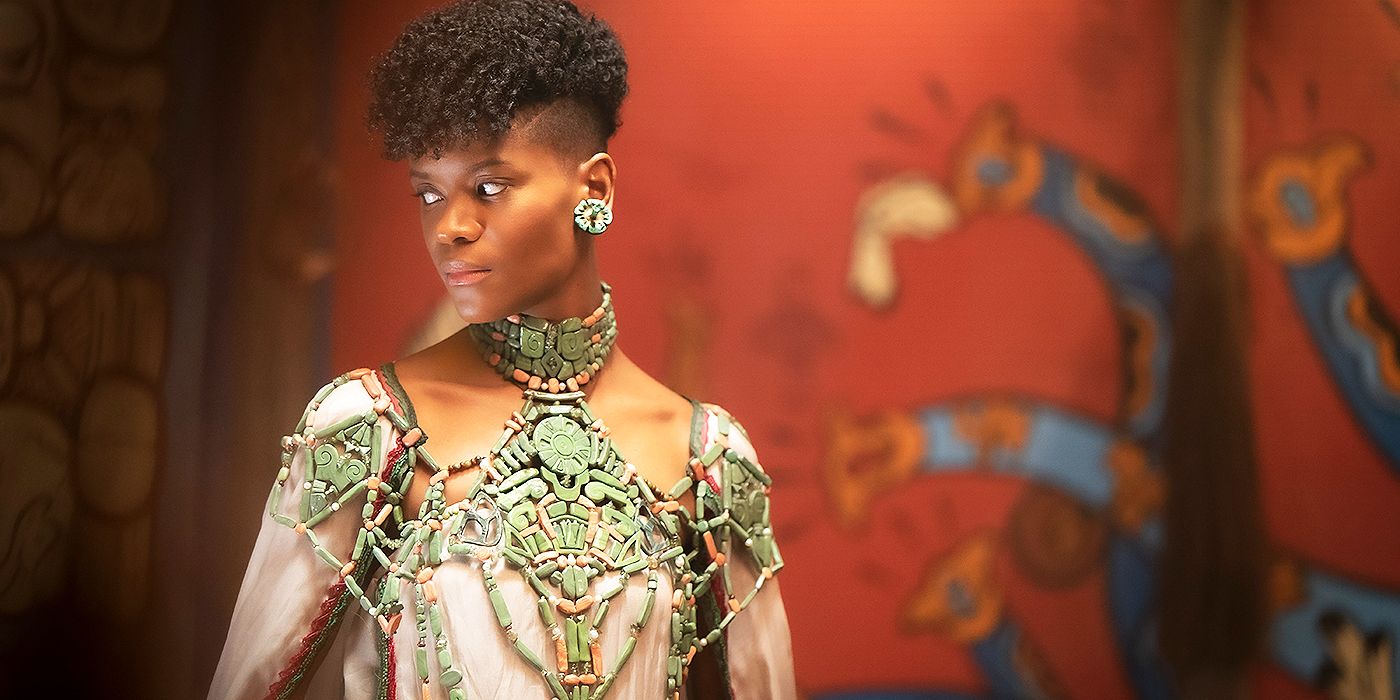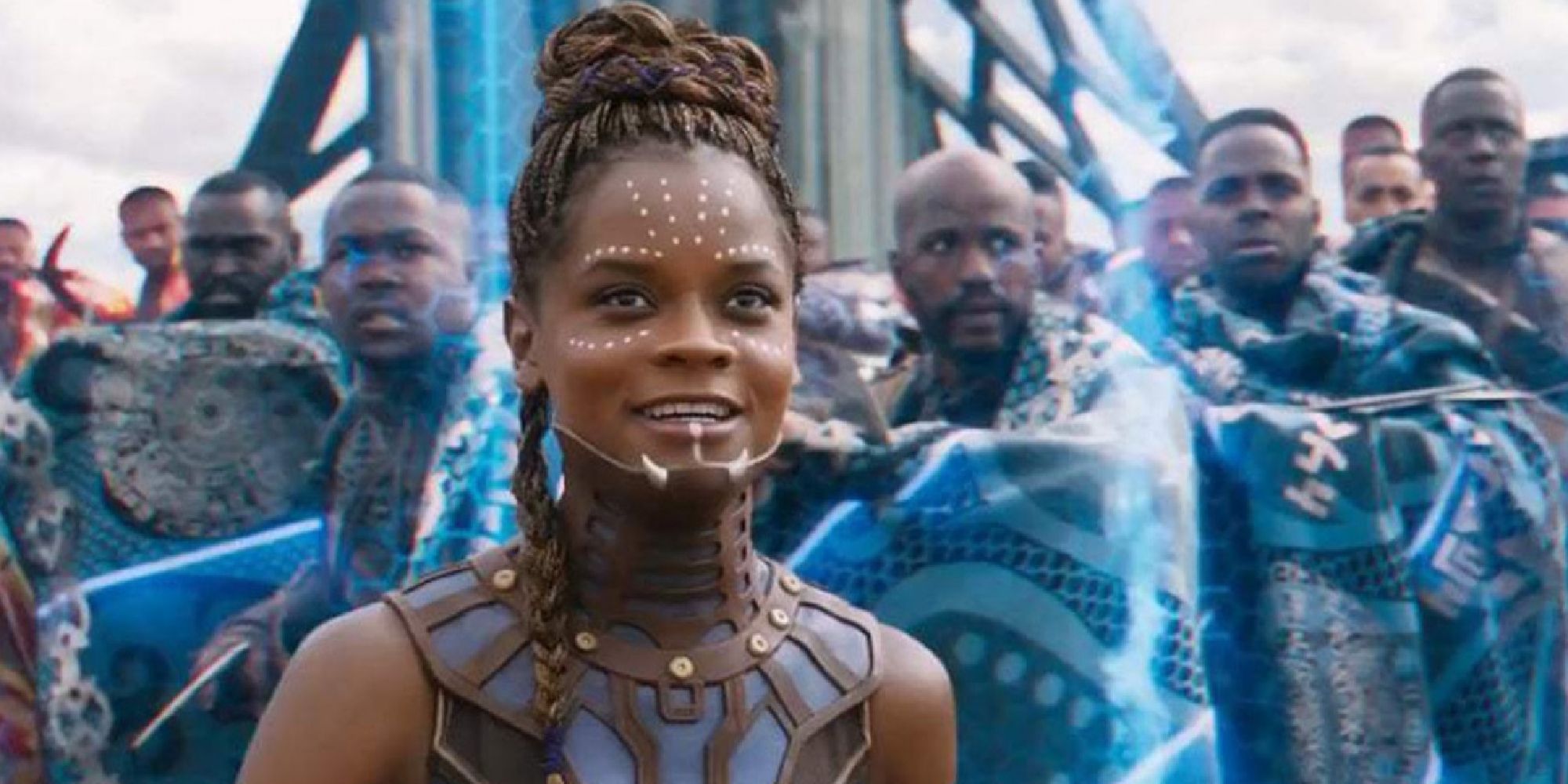Editor's note: The following contains spoilers for Black Panther: Wakanda Forever.The opening scene of Black Panther: Wakanda Forever is a frenzy of activity as Princess Shuri (Letitia Wright) desperately tries to create an artificial Heart-Shaped Herb. We soon find out why—she needs the plant to save the life of her brother, King T’Challa (Chadwick Boseman). T’Challa is suffering from a terminal illness, and just as Shuri prints the most viable version of the herb, she learns from Queen Ramonda (Angela Bassett) that T’Challa has died. A few moments prior, Shuri’s artificial intelligence, Griot (Trevor Noah), had requested her to join her brother, but Shuri had refused because she hadn’t finished working on the Herb. And thus, T'Challa died without Shuri by his side.
Shuri is wrecked by grief that she is unable to process. She is a genius whose technological know-how is unparalleled, and yet, as she explains to Namor (Tenoch Huerta Mejía) in a later scene, she was unable to use her gifts to save her brother. This heart-breaking realization fuels Shuri’s arc in Black Panther: Wakanda Forever.
Shuri is a pragmatic person. She doesn’t willingly accept Wakandan traditions and beliefs. During T’Challa’s funeral procession, a glorious event that celebrates his life, we see Shuri frozen in shock, unable to cry, smile, or accept what’s happened. A year later, when Ramonda reminds Shuri that T’Challa’s death doesn’t mean he’s gone, he’s simply with his ancestors, the knowledge brings her little comfort. And because she’s unable to let go of her anger over not being able to save T’Challa, she can’t fully participate in the Wakandan anniversary rituals either. It’s a vicious cycle that Shuri is stuck in, and the only thing that brings her any modicum of peace is science.
The Beginnings of a Hero
Shuri’s journey from being a rebellious genius to a somber hero is unconventional and emotional. Most of us guessed that Shuri was going to be Black Panther in the sequel, but it’s the characterization that writers Ryan Coogler and Joe Robert Cole create which is so compelling and brilliantly written.
In the first film, Shuri was a precocious youngster without a care in the world. Despite her father’s assassination, she seemed untamable. But once T’Challa was seemingly killed and dethroned by Erik Killmonger (Michael B. Jordan), we saw a sea-change in her personality. Wright captured Shuri’s fear and confusion over being displaced and on the run, as well as her later return to confidence when Shuri was back in her lab and part of the fight. Shuri as Black Panther doesn’t emerge until the third act of Black Panther: Wakanda Forever, because being Black Panther isn’t her goal, protecting Wakanda is. Once T’Challa dies, Wakanda is sans a visible protector, so Shuri throws herself into her science so that Wakanda is always safe.
We see sparks of Shuri’s precocity emerge whenever she’s working, especially when she meets Riri Williams (Dominique Thorne), another young Black genius scientist like herself. Shuri is impressed by Riri’s work well before she meets her and instead of being jealous or threatened by the teenager’s phenomenal talents, Shuri is immediately protective of her from the Talokanil and enlists Riri’s technological help in every fight.
Writing Shuri to Her Strengths
She has heroic moments even before she puts on the Black Panther suit. Shuri isn’t a superhero for the majority of the film, but she has reckless energy and is a quick thinker. She can escape the FBI, but she can’t fight off the super-powered Talokanil who abduct her and Riri. So, Shuri uses her tactical skills to engage with the Talokan’s leader Namor. There’s an obvious bond between the two, especially given how empathetic Shuri is. It’s a relief that Shuri and Namor’s chemistry does not lead to a star-crossed romance, because it certainly looked like the pair were headed in that direction at one point. But Coogler and Cole develop their relationship differently. Shuri understands Namor’s anger about his mother and ancestors having to move underwater because they were dying in the surface world. She is awed by the world the Talokanil have built, and she recognizes in Namor a fellow outsider in his own world. She even tries to save the life of one of her captors but is rescued before she can.
Shuri is not a perfect hero, but she isn’t the usual angry person beating her grief out of her enemies either. She is unflinching when Namor threatens to attack Wakanda if it comes in the way of his war against the surface world. It’s only when Namor kills her mother that Shuri unleashes a torrent of emotion. The scene when Shuri tries to break free as Okoye (Danai Gurira) tries to resuscitate Ramonda is devastating. Wright’s emotional pain is so palpable it’s almost unbearable to watch. And the change in her demeanor from overwrought in the throne room to stoic during Ramonda’s funeral is unnerving. It’s painfully ironic that Ramonda had chastised Okoye because she was the Queen of Wakanda and had no family left, and then Shuri is the one who actually lives that reality.
The Power of Loss
Having lost her father in Captain America: Civil War, Shuri, in the span of a year, also loses her beloved brother and her mother. You can feel the shock of those losses permeate through Wright’s performance. Shuri is no longer the effervescent youngster we knew—the responsibilities of the Wakandan throne fall upon her, and she must lead her people in an upcoming battle against a formidable foe. All these responsibilities, she takes on reluctantly—Shuri has always been a scientist with no aspirations for the throne or for the mantle of Black Panther.
When Shuri is finally able to recreate the Heart-Shaped Herb and enters the Ancestral Plane, she is able to come to terms with her state of mind. In the Ancestral Plane, Shuri is not reunited with her family, instead, she meets Killmonger, and she voices her turmoil to him. She is angry, and she wants vengeance—just as Killmonger once was. This scene is a turning point for Shuri’s characterization. Up until this point, Shuri has always been kind and heroic, but she’s human, and she’s been pushed too far. And, when the promise of seeing her loved ones in the Ancestral Plane is also taken from her, she admits her desire for retribution—she needs Namor dead. The scene underlines the possibility of Shuri becoming villainous because, as she says, she is not her brother. Where T’Challa was noble and forgiving, almost to a fault, Shuri is filled with righteous anger and revenge. It’s a suspenseful moment in the film, but also adds a new layer to Shuri—she has flaws. How refreshing to see a female character who isn’t perfect.
In the end, Shuri does choose to spare Namor’s life. During the battle between Wakanda and Talokan, Shuri and Namor break away to fight on their own, and she comes close to killing him. But Shuri sees her mother, which could be a hallucination or perhaps the lingering effects of the Herb, who tells Shuri to ‘show him who you are’. Shuri is not a killer; she is Wakanda’s protector, and she won’t let Namor harm her country again. Shuri and Namor are both consumed by vengeance, but Shuri, like her brother in Captain America: Civil War, won’t let it consume her further.
Shuri Becomes a Hero
Shuri ends the film by completing the ritual to honor her brother’s death, something she’d been unwilling to do earlier in the film. It’s a small step towards finally embracing the traditional aspects of her people, giving balance to the scientific and spiritual sides of her life. Not only does this provide her with closure, but anyone who has felt like an outsider in their own culture will find catharsis in Shuri’s acceptance. However, Shuri still manages to hold on to some of her rebelliousness—she undertakes this ritual by foregoing the ritual combat all Black Panthers must undergo. And to demonstrate her continuing sense of humor, Shuri sends M’Baku (Winston Duke), the Jabari leader who had challenged T’Challa’s right to the Black Panther mantle and had chided Shuri’s disrespect of Wakandan customs.
Shuri may not have originally been written as the eventual protagonist of the Black Panther films, but she is effortlessly the star of this film. Wright captures all the layers of the character through her exuberance, her anger, her emotions, and her heroism. Shuri is brave and empathetic, as we see through her interactions with Namor in Talokan. She is secure in her abilities, so doesn’t see Riri as a threat. But she is human and consumed by vengeance. Shuri’s growth as a character and a hero in this film is unlike other heroes’ journeys—her arc is fueled by grief that is new and raw, but the death of her brother doesn’t define her. Shuri takes her time becoming the hero but doesn’t lack heroics before putting on the suit. It’s so delightful to see a female character written as a complex and flawed protagonist in a superhero film.

